In 2015, there are 16 Hand pump technicians covering the 13 chiefdoms of Bombali district and who are regularly supervising almost 500 hand pumps out of the 1300 and more existing ones in total.
Link to the map on pdf : 2016 05 20 PO map A4
| Inter Aide | Contact |


In 2015, there are 16 Hand pump technicians covering the 13 chiefdoms of Bombali district and who are regularly supervising almost 500 hand pumps out of the 1300 and more existing ones in total.
Link to the map on pdf : 2016 05 20 PO map A4
N.B. : These descriptions will have to be updated as the WaSH sector is moving in Sierra Leone and Institutions might be re-organised…
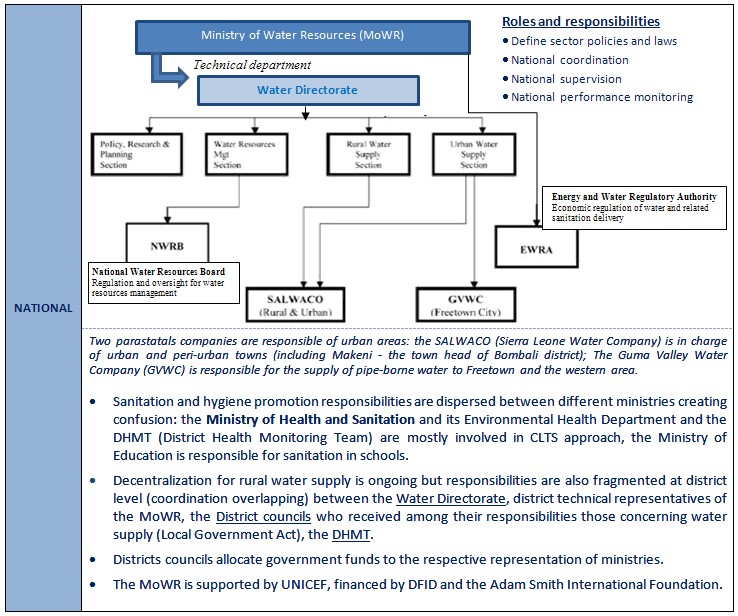 The National Water and Sanitation (WASH) Policy of 2008 allowed the shift from a Water Supply Division of the Ministry of Energy, to Water Directorate of the Ministry of Energy and Water Resources, and in 2013 to a dedicated Ministry of Water Resources and an on-going structuration of the sector.
The National Water and Sanitation (WASH) Policy of 2008 allowed the shift from a Water Supply Division of the Ministry of Energy, to Water Directorate of the Ministry of Energy and Water Resources, and in 2013 to a dedicated Ministry of Water Resources and an on-going structuration of the sector.
Saidu Fofanah is one of the hand pump technician. Saidu is 45 years old, he contracted poliomyelitis at the age of 10. The fact he needs crutches to move does not prevent him to support his community by repairing their pumps.
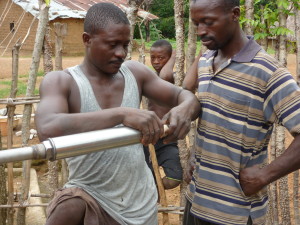 He has been identified by Inter Aide to work as a hand pump technician in Safroko Limba chiefdom in 2014. 86 hand pumps have been inventoried by the team in Saidu’s catchment, he has been able to intervened in 18 of them so far (despite the Ebola crisis, and the restriction of movements as well as suspicion by the villagers of visitors it entailed).
He has been identified by Inter Aide to work as a hand pump technician in Safroko Limba chiefdom in 2014. 86 hand pumps have been inventoried by the team in Saidu’s catchment, he has been able to intervened in 18 of them so far (despite the Ebola crisis, and the restriction of movements as well as suspicion by the villagers of visitors it entailed).
He was until now under observation and on-the-job training by Inter Aide but he will be soon confirmed at this position and will get his own toolbox in September.
He was initially in competition with Mr. Pa Tamba for this position of pump technician for Safroko Limba chiefdom. Both of them had already good knowledge on pumps repairs but as Pa Tamba was known in more communities than Saidu, and maybe the worry concerning the ability of Saidu to move easily from one community to another to promote his services or just to access the needing water committees by himself made the first choice of Inter Aide to collaborate with Pa Tamba.
Unfortunately Pa Tamba was not serious enough as he was overcharging the villagers for interventions and because some repairs were not good enough to last long. Therefore, Inter Aide decided to promote Saidu. Despite the fact that he doesn’t know how to read and write and his handicap, the choice of nominating him as pump technician was not so difficult knowing his involvement in the community: in parallel of his activity in a growth centre since 1988 to train young people on insertion business such as carpentry or welding, Saidu was already doing hand pump repairs on his own during the five past years. Indeed, after being volunteer for a three weeks training at the district council, he was operating on demand of the communities – approximately already 11 communities in 2010. He was paid at that time 20 000 Le per repair but he was managing with local tools which made it difficult. This promotion made it official and professional…
After one year and a half (Ebola put on stand-by the activities and slow-down the process), Saidu has been officialised and get his tool box in September 2015. The Inter Aide team noticed during this period that he has strong technical knowledge especially on India Mark II and PB2 hand pumps but less on Kardia – this has been corrected with the training of September ! He has always been motivated and serious and is relevant in the messages delivered during community meetings, although the training was necessary to clarify the difference between repair – for sudden breakdown – and maintenance – regular preventive checkup and diagnosis to clean the whole system of the pump, to identify parts that need to be changed before it breaks and causes more damage…
Saidu is dynamic but we could also say that he can be a bit tough while operating and has to work on his patience to explain to pump caretaker !
Despite his handicap, Saidu intervened in 18 communities since a year and a half (and despite Ebola) . It doesn’t seem a problem as he organised himself to make his job easier, like installing pipes and tools, tool box on two benches so that his hands can reach everything easily, and he received support from the water committee (as it supposed to be for all pump technicians anyway). He is also very agile and strong as he can screw cylinder on pipes with his leg on his crutch ! see pictures below.
For now, he is busy intervening on hand pump approximately 3 times per month, but he is expecting supervising around 60 hand pumps in the near future.
His elder son (he has five children) is helping him by transporting him to the sites with his motorbike (or okada in Kryo).
When we asked Saidu how the people perceived his handicap, he said they were curious at the beginning, but what we observed is that Saidu is well known by the communities and is someone who was already involved in lot of activities to support and help his community.
During Ebola, which started around May 2014, people were confined and movements were reduced to the strict minimum to avoid the spray of the virus. Almost all activities were on standby, including Inter Aide programs. The constructions of new water points or rehabilitation especially were on hold as it was not relevant to move to new communities – although the team did a lot of sensitization and prevention related to hygiene and measures to follow in case of suspicion of sickness – washing hands and consulting treatment centre – in the communities where we used to work, in particular in the north of Bombali around Kamakwie.
It has been the same for the hand pump technicians: the follow-up they used to do inside their catchment was reduced to the neighbouring communities as some villagers perceived Ebola as a poison and they had a big fear of outsiders. Although the villages who experienced breakdowns of their hand pump have been obliged to contact their hand pump technician.
For example, for Saidu, during this almost one year period – activities restarted in May 2015 – he received only one call in February 2015 from a desperate village: one Ebola spot community contacted the authorities and send security guards and the police to collect Saidu for a repair. He came to diagnose and fortunately the community had the required connecting rods that were to be changed. For this particular intervention he used gloves and long leaves and used the chlorine available at the community.
Since 2007, in Bombali
| New hand-dug wells constructions : | 74 |
| Rehabilitations* : |
36 |
| Water committees trained or refreshed : |
703 |
| First repairs** : | 327 |
| Communities under a preventive maintenance strategy*** : | 183 (out of 1300 functioning wells) |
* Complete work done by Inter Aide on hand-dug wells or boreholes to renovate the system : re-construction of the structure (rebuilding well platform, increasing depht, changing rings etc.), repairing pump or changing to stainless parts…
** Communities who decided to contact a hand pump technician for a first rehabilitation of their hand-pump
*** Communities who contact hand pump technicians for a regular annual diagnosis of their hand pump
Collaboration and capacity building initiated :
1. Inter Aide provided support to the Water Directorate of Bombali for water quality analysis: trainings on bacteriological analysis procedures, evaluation of the maintenance and respect of standards for the laboratory .
2. The Water Directorate of Bombali district and Inter Aide were jointly organizing monthly coordination meetings before the Ebola crisis. It restarted with Unicef in June 2015 who is now supporting the WD in the same direction. The objective is to provide support in terms of:
3. Organization of joint monitoring missions : a rotation between actors has been set up to allow on-site visits of constructions and activities in order to facilitate exchange of good practices.
A practical guide has been developed by the team in SIerra Leone for the Field Facilitators working with villages’ members for the organisation of the management and maintenance of their water system. This guideline provides some illustrated resources to help them preparing and conveying training and animations.
Refers to the following link for all related documents : www.interaide.org/pratiques/content/manual-water-committees-training-sierra-leone-tool-eng-0?language=en
The first general document is a general presentation of the tool with reminds of mains steps: www.interaide.org/pratiques/sites/default/file/presentation_outil_formation_comites_eau_sept_14.pdf ![]()
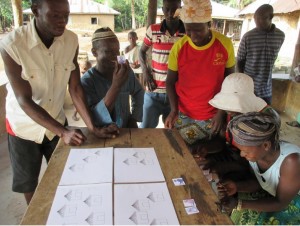
Role play: a water committe member has to pick a card representing one specific positon among the committee and she/he will have to act according to this position and the scenarios the team are creating for the game.
The full guide is available here: www.interaide.org/pratiques/sites/default/files/final_guide_v2_0.pdf ![]()
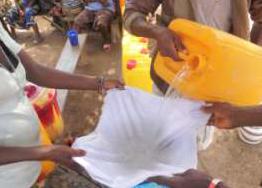 Water treatment at the household level ensures that the family is in charge of the safety of their own drinking water. In communities where there is no access to an improved water point or hand pump facility, household water treatment (HHWT) provides an interesting solution for families to reduce diarrheal disease. HHWT represents an affordable solution and easy to implement in small villages, providing that the training is done thoroughly.
Water treatment at the household level ensures that the family is in charge of the safety of their own drinking water. In communities where there is no access to an improved water point or hand pump facility, household water treatment (HHWT) provides an interesting solution for families to reduce diarrheal disease. HHWT represents an affordable solution and easy to implement in small villages, providing that the training is done thoroughly.
This document comes back on an experience conducted for more than 2 years in several small villages of the north part of Bombali District. It gives some clues on the approach followed by the project to implement HHWT: the methods to sensitize and train the community, the way to determine the good dosage, the setup of a store supply chain, and also a description of remaining bottlenecks that need to be addressed. View pdf: HHWT
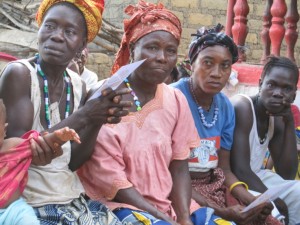 There are many essential reasons why women should be more involved in a community water resources project. In order to have more women participation, we need to better understand the role women play and how access to water can improve not only their own development but expand to many other opportunities.
There are many essential reasons why women should be more involved in a community water resources project. In order to have more women participation, we need to better understand the role women play and how access to water can improve not only their own development but expand to many other opportunities.
This small paper aims at giving some clues to increase women’s participation for decisions related to the management and maintenance of a collective good, the water supply infrastructure. See pdf: involving women ![]()
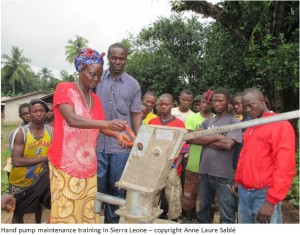 See also in the following document how concretely Inter Aide is integrating gender considerations into its approach, meetings and trainings with the communities. This tool is general recommandations and guidelines for animators. www.interaide.org/pratiques/sites/default/files/women_empowerment_sept_2014.pdf
See also in the following document how concretely Inter Aide is integrating gender considerations into its approach, meetings and trainings with the communities. This tool is general recommandations and guidelines for animators. www.interaide.org/pratiques/sites/default/files/women_empowerment_sept_2014.pdf ![]()
